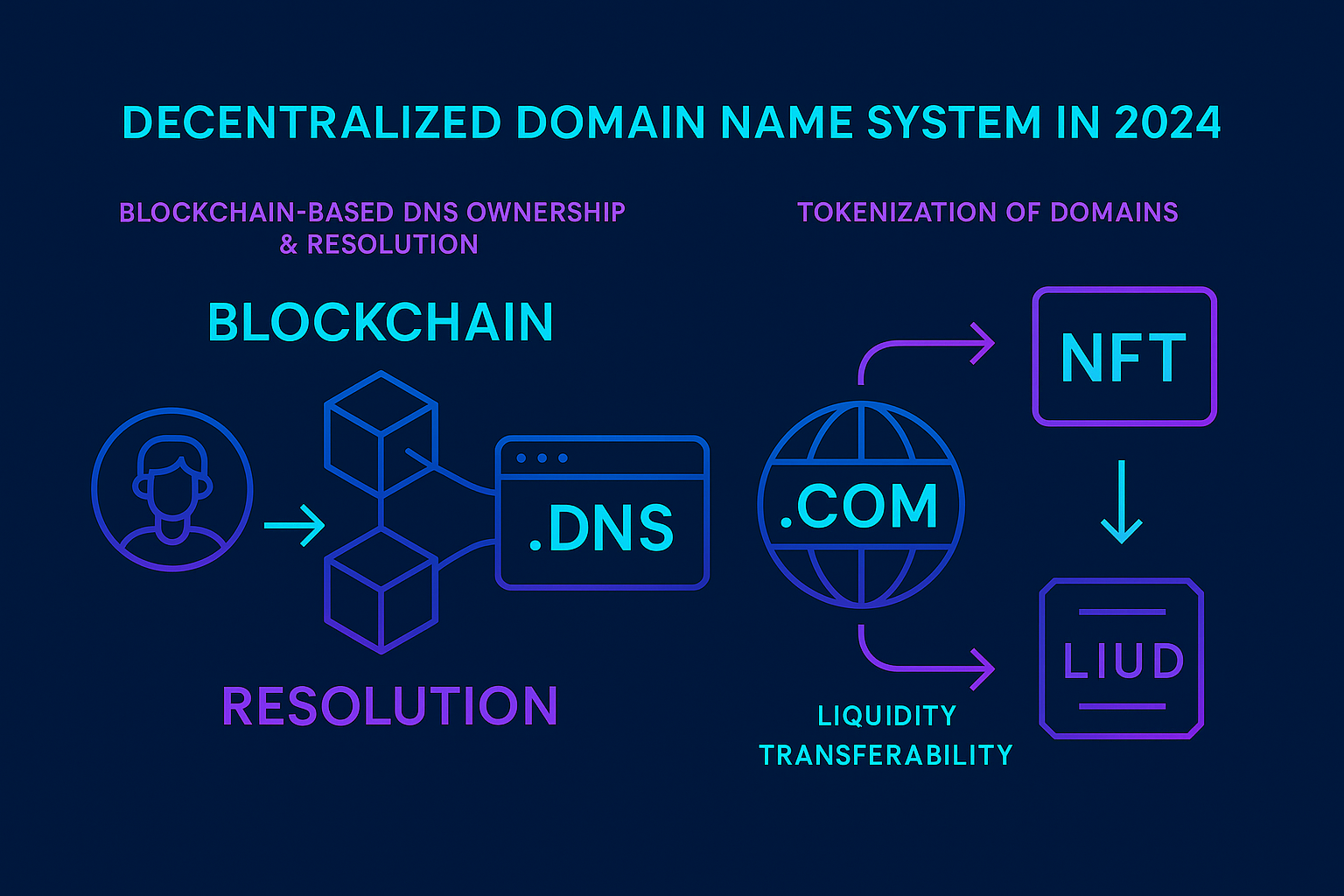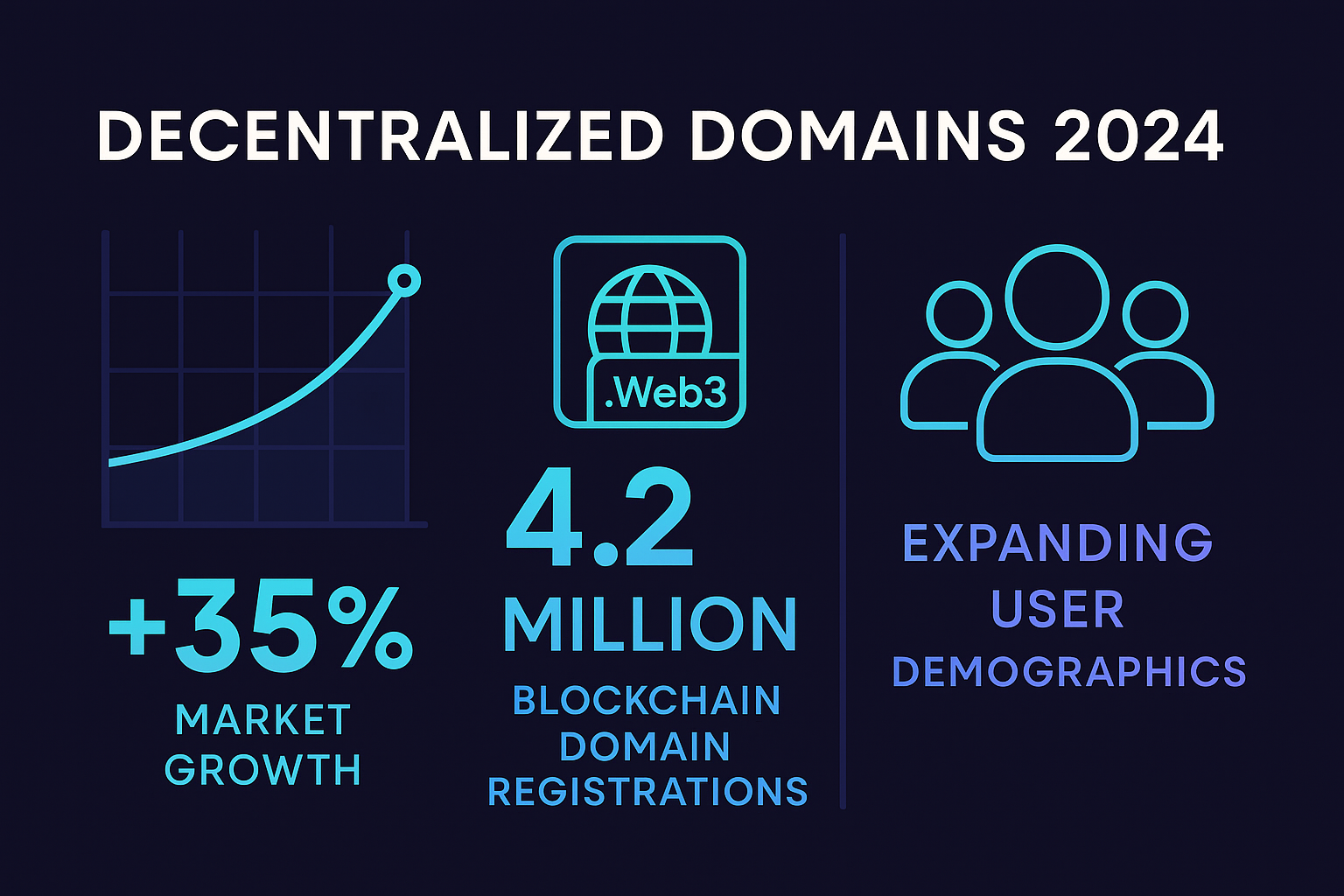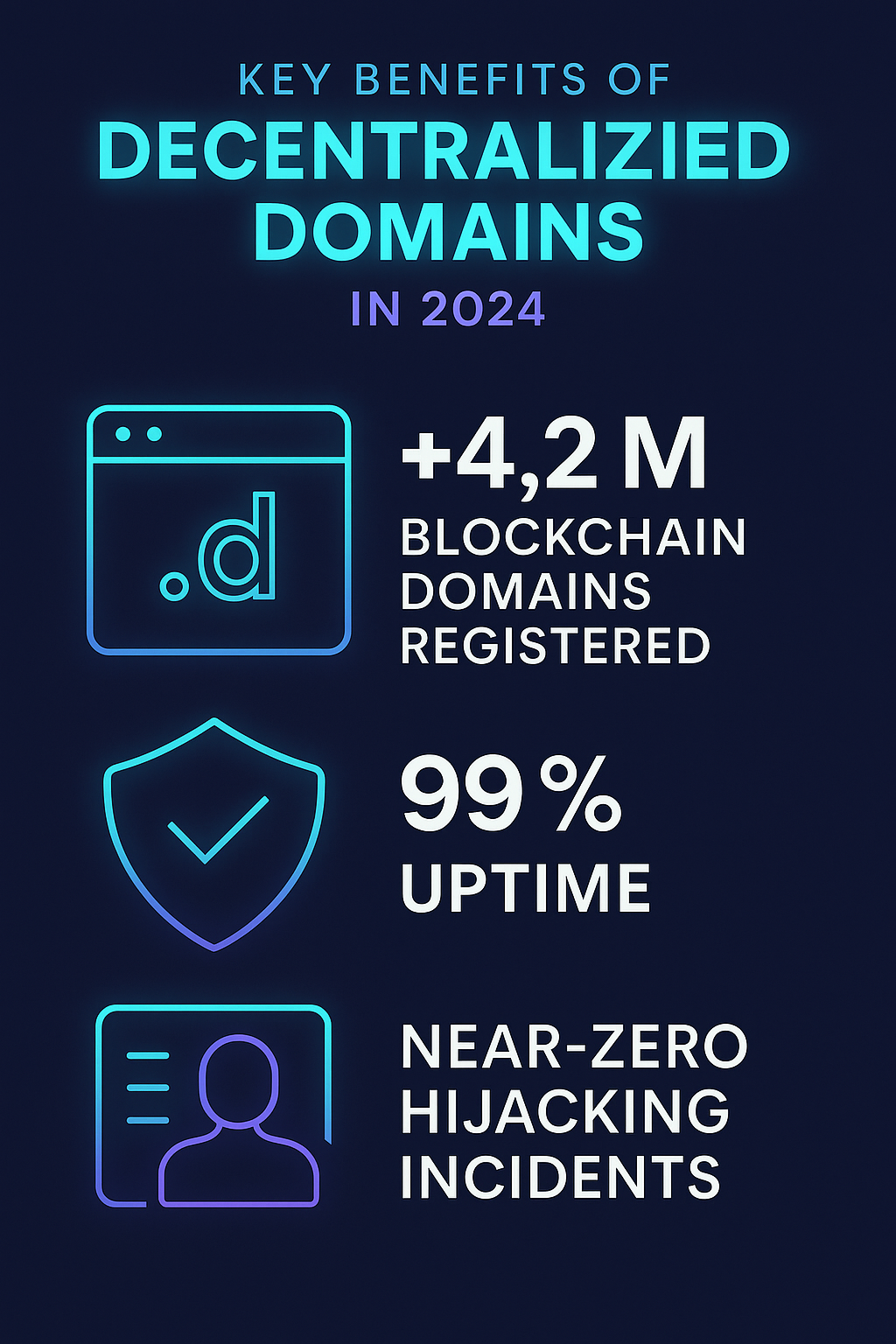Table of Contents
Introduction
Over the past decade, the emergence of decentralized domains has marked a fundamental transformation in the world of internet infrastructure and digital identity. As more individuals, developers, and businesses pivot towards the Web3 paradigm, the limitations of the traditional domain name system become increasingly pronounced. By leveraging blockchain technology and distributed networks, decentralized domains are redefining how we manage, secure, and monetize our online presence.
At the heart of this revolution, decentralized domains offer a variety of game-changing advantages: enhanced security, true ownership control, censorship resistance, and seamless integration with blockchain-based applications. Unlike traditional DNS providers, which are governed by centralized authorities, decentralized solutions put users in control of their own digital assets. This shift is empowering a new generation of Web3 users, creators, and entrepreneurs to forge resilient, autonomous digital identities without the risk of arbitrary takedowns or hijacking incidents.
This article will explore:
- The fundamental workings of the decentralized domain name system
- Operational mechanisms and benefits of blockchain domain tokenization
- Why decentralized domains matter for security, privacy, and self-sovereignty
- High-impact applications across decentralized hosting, crypto payments, marketing, and more
- Key distinctions between decentralized and traditional DNS systems
- Market adoption trends that reveal the unstoppable rise of Web3 domains
What Are Decentralized Domains?
Decentralized domains are blockchain-based replacements for traditional internet addresses, offering a new model of online identity management that removes centralized gatekeepers. Unlike legacy DNS, which is governed by entities such as ICANN, decentralized domain owners use smart contracts and cryptographic proofs to manage their domains directly on distributed ledgers. This ensures immutability, tamper resistance, and user sovereignty, eliminating risks of censorship or unauthorized transfers.
Importance in Web3 Ecosystem
Within the Web3 ecosystem, decentralized domains play a pivotal role by creating robust foundations for censorship-resistant websites, interoperability with decentralized applications, and secure management of blockchain identifiers. As adoption accelerates, these domains empower users—whether individuals or organizations—to establish verifiable digital identities, promote privacy, and monetize digital assets without relying on centralized intermediaries.
Over 4.2 million blockchain domains have been registered globally in 2024, with decentralized services achieving 99% uptime and near-zero hijacking incidents.

Understanding Decentralized Domains
The concept of decentralized domains combines cutting-edge developments in distributed ledger technology with the familiar functionality of domain name systems. To appreciate their growing impact, it’s essential to examine the underpinnings of the decentralized domain name system, how these domains function, and the role of blockchain domain tokenization.
What Is a Decentralized Domain Name System?
A decentralized domain name system (DDNS) is a network protocol that uses blockchain or distributed ledgers to register, resolve, and manage domain names without central control. Instead of relying on root servers and registrars governed by ICANN, ownership is established through cryptographic transactions and maintained by a peer-to-peer consensus mechanism. While traditional DNS entries can be altered, revoked, or censored, decentralized DNS provides:
- Immutability of domain records, ensuring that once registered, a domain cannot be forcibly altered by any single party.
- User-controlled access and transfer, leveraging private keys for domain management.
- Resistance to common vulnerabilities like DNS hijacking, DDoS attacks, and registrar-based censorship.
According to One Registry’s analysis, decentralized DNS resolvers fetch data directly from a blockchain, making records tamper-resistant and accessible worldwide without dependence on vulnerable, centralized infrastructure.
How Decentralized Domains Work
Functionally, decentralized domains operate through smart contracts deployed on blockchain platforms. When a user purchases a Web3 domain, ownership is recorded on-chain, and all subsequent actions—mapping to content, renewal, or transfer—are executed via secure smart contracts. This eliminates the need for intermediaries and provides:
- Instant, trustless domain transfers based on cryptographic validation
- Flexible integration with decentralized storage solutions (like IPFS)
- Automated features such as perpetual ownership, embedded programmability, and seamless renewals with no additional fees (Unstoppable Domains)
Security is further boosted by on-chain ledger immutability, which ensures domain ownership can’t be contested or taken down arbitrarily—enabling new possibilities for both individuals and organizations engaging in the decentralized web.
Blockchain Domain Tokenization Explained
The leap from traditional domain registration to blockchain domain tokenization has unlocked a wealth of new use cases and financial models. Platforms now convert domains into non-fungible tokens (NFTs), enabling features such as:
- Liquidity: Domains become tradeable assets in open marketplaces
- Seamless transferability: Instant transfer of ownership via blockchain transactions
- DeFi integration: Domains can be collateralized, leased, or bundled with smart contracts for novel financial instruments (3DNS analysis)
Solutions like the Ethereum Name Service (ENS) and Handshake enable users to own domains as NFTs, mapped to digital wallets, smart contracts, and decentralized websites. These advancements are driving enormous momentum in the blockchain domain market.
Benefits of Decentralized Domains
The rise of decentralized domains is fueled by a core set of benefits that directly address shortcomings in traditional systems.
Enhanced Security and Ownership Control
Security is enhanced by blockchain’s cryptographic underpinnings, making ownership records tamper-proof and reducing susceptibility to hijacking or manipulation. As noted by Hashtag.it.com, smart contracts facilitate:
- Automated, transparent domain renewals and secure transfers
- Elimination of single points of failure—reducing risks from registrar hacks or mismanagement
- Permanence: users hold private keys and retain ultimate ownership control (blockchain domain security)
Censorship Resistance and Privacy
One of the most powerful benefits is censorship resistance. Because decentralized domains and their associated records reside on blockchain networks, they:
- Cannot be unilaterally taken down by governments or central registries
- Empower users to maintain their digital presence—even in restrictive environments
- Support privacy by avoiding centralized tracking or data retention (censorship resistance)
This fosters true freedom of expression and data sovereignty, enabling resilient communication and business operations globally.
Improved Digital Identity Management
Decentralized domains revolutionize how individuals and organizations manage their digital identity. Through:
- User sovereignty: Control over credentials, public profiles, and reputation without intermediaries
- Interoperability with digital wallets, DApps, and cross-chain platforms
- Privacy-preserving integration: Personal information can stay private or be selectively shared
This makes decentralized domains central to next-generation identity systems—foundational for secure blockchain-powered commerce and communication.
Applications of Decentralized Domains in Web3
The versatility of decentralized domains fuels a diverse ecosystem of Web3 applications.
Decentralized Websites and Hosting
By connecting domains directly to decentralized storage (like IPFS) and on-chain content hashes, users can build decentralized websites that are censorship-resistant and always online. Benefits include:
- Global accessibility, even under network restrictions
- Permanent, tamper-proof content mapping
- Robust protection from attacks or takedown requests
As detailed by Hashtag.it.com, blockchain domain registries operate without central authorities, empowering creators and communities to publish with confidence.
Crypto Payments and Cross-chain Integration
Decentralized domains streamline the process of linking crypto wallets to easy-to-read domain names, powering applications like:
- Secure, efficient crypto payments
- Cross-chain transactions and integrations between different blockchain protocols
- Identity anchors that connect disparate Web3 services (blockchain identifiers)
This integration eliminates friction in user experiences and creates new revenue opportunities.
Branding, Marketing, and Monetization
For businesses and individuals alike, Web3 domains unlock cutting-edge options in branding, digital marketing, and monetization:
- Memorable, unique domains that elevate digital presence
- Participation in secondary marketplaces and blockchain domain token sales
- Enhanced market reputation through transparency and verifiable ownership
By coupling domains with NFTs and smart contracts, innovative revenue streams—such as leasing, fractional ownership, and affiliate models—become possible.
Comparisons and Future Outlook
With rapid infrastructure innovation, it’s critical to compare decentralized domains to their traditional DNS counterparts, while also considering the future trajectory of the domain industry.
Decentralized Domains vs Traditional DNS
The defining differences between decentralized DNS and established systems are:
- Security and control: Decentralized domains utilize blockchain validation, reducing tampering and unauthorized access
- Censorship resistance: Ownership and content mapping reside on-chain, bypassing centralized takedowns
- Ownership model: Most Web3 domains are acquired permanently (no renewal fees), while DNS registrants pay recurring charges (tokenization benefits)
By contrast, ICANN-governed DNS relies on hierarchical authorities, which present vulnerabilities and recurring costs.
Current Challenges and Limitations
Despite robust promise, current limitations include:
- Usability hurdles in registration and management interfaces
- Scalability issues as blockchains contend with growing domain registrations
- Risks of name collisions and interoperability with Web2 services (Advanced Perspectives)
Hybrid initiatives and advances in protocol design, as seen with 3DNS and Freename, are tackling these challenges to bridge legacy and decentralized architectures.
Market Trends and Adoption Statistics
As of 2024, the blockchain domain market has surpassed 4.2 million registered domains with a projected 35% annual market growth. The largest drivers of this uptick include:
- Integration by browsers like Brave for on-chain naming services
- Expansion of user demographics—including creators, brands, and developers (decentralized domain user demographics)
- Proliferation of Top-Level Domains (TLDs) purpose-built for DAOs, DeFi, and creator communities

The future of digital identity and online presence is rapidly converging on the principles of decentralization, transparency, and user empowerment.
Conclusion
Summary of Key Benefits and Applications
In summary, decentralized domains are reshaping digital identity, website hosting, and ownership models by granting:
- Impenetrable security and ultimate control through cryptographic proofs
- Unmatched censorship resistance and privacy for global internet users
- Flexible integration with crypto payments, DApps, and digital asset markets
Businesses, developers, and individuals adopting Web3 domains gain sovereign authority over their digital footprint while unlocking innovative branding and monetization opportunities. This new paradigm elevates the internet into a borderless, user-empowered ecosystem.
Call to Action
To remain ahead in the evolving digital landscape, now is the time to embrace decentralized domain management. Explore decentralized domain registration today to secure your digital identity and enhance your Web3 presence. By moving beyond centralized systems, you’ll gain lasting security, privacy, and autonomy in the emerging online world.
Resources
- Decentralized vs. Traditional DNS – One Registry
- An Analysis of 3DNS, ENS, HNS, and GoDaddy
- A COMPREHENSIVE GUIDE TO ETHEREUM NAME SERVICE (ENS) IN CRYPTOCURRENCY
- Blockchain identifiers: Are they ready to compete with the DNS?
- A Survey on Decentralized Identifiers and Verifiable Credentials
- The Rise of Crypto Domain Names and Their Potential Impact
- Secure Blockchain Domains: A New Era of Digital Ownership
- Understanding Crypto Domains and Their Promise
- Blockchain Domain Registry and Its Future Prospects
- The Growing Significance of Crypto Domains
- Brave Becomes First Browser to Launch Onchain Naming Service, Unlocking .brave for Over 85M Users
- ICANN vs. Web3 Registrars
- DNS Vs Web3: Why Only One Requires Renewals
- The Expanding Ecosystem of Web3 TLDs: From .eth to .dao, What’s Next?
- #Space – #Space – Resolving Web3

Leave a Reply